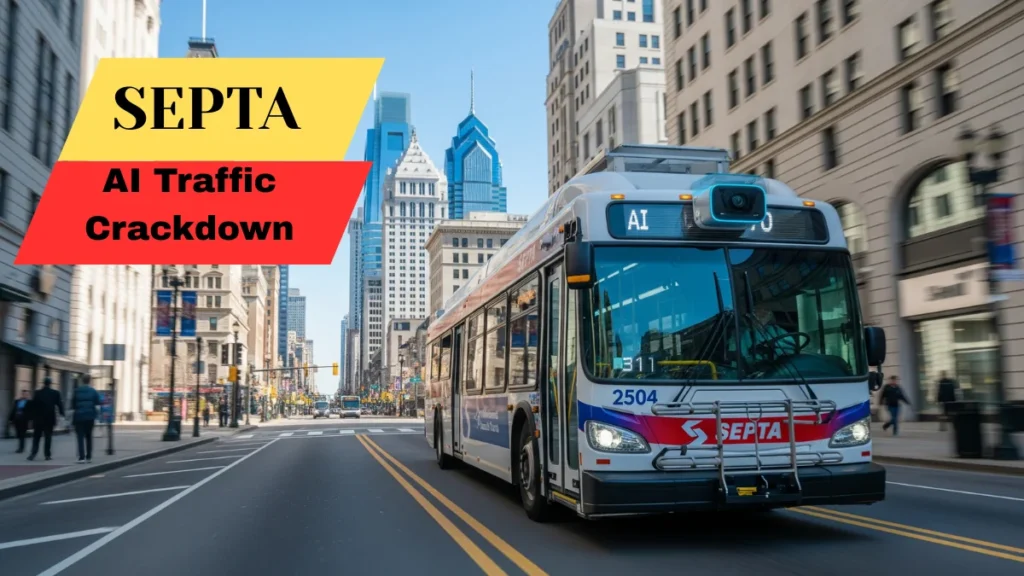Philadelphia is taking a high-tech step to keep buses moving. SEPTA’s new AI-powered cameras promise faster commutes—but public trust will make or break the system.
Key Takeaways:
- Citywide AI Enforcement: More than 150 buses and 38 trolleys now carry cameras to catch lane-blocking vehicles.
- Fines in Seconds: $76 in Center City, $51 elsewhere—after human review confirms the violation.
- Trust at Stake: Only 28% of organizations have solid AI governance, raising fairness concerns.
- Public Transparency Needed: Clear rules, open data, and easy appeals can prevent backlash.
Bus riders in Philadelphia could see their commutes get faster thanks to a new citywide rollout of artificial intelligence enforcement. The Southeastern Pennsylvania Transportation Authority (SEPTA) and the Philadelphia Parking Authority (PPA) have fitted more than 150 buses and 38 trolleys with AI-powered cameras designed to spot vehicles blocking dedicated bus lanes.
The move follows a 2023 pilot program in which just seven buses, equipped with the technology, flagged over 36,000 violations in only 70 days. The message was clear: blocked bus lanes are a chronic problem—and AI might be the key to clearing them.
From Pilot to Policy
The newly launched program uses computer vision to scan for vehicles obstructing bus routes. Once a potential violation is detected, the system reads the license plate and sends the footage to a human reviewer. If confirmed, the driver is issued a ticket—$76 in Center City, $51 elsewhere.
For SEPTA, this isn’t just about traffic flow. The agency is facing a $213 million budget shortfall, with looming service cuts and fare hikes. The fines won’t close that gap entirely, but they may help offset losses while improving reliability.

Speed Meets Scrutiny
While the efficiency is undeniable, experts warn that public trust will determine whether the program succeeds in the long run.
A Drexel University survey of 454 business leaders—across tech, healthcare, manufacturing, finance, and government—found that over 70% don’t fully trust their own AI-generated data. Even more concerning: only 28% have robust AI governance models in place.
“In public enforcement, stakes are higher,” says the Center for Applied AI and Business Analytics at Drexel. “You’re not just automating efficiency—you’re enforcing laws. That demands fairness, accuracy, and transparency.”
The “AI Label” Trust Gap
There’s another twist—how people react when they hear “AI.” Research shows that even when a process is identical, labeling it as AI-driven can make people trust it less.
That means SEPTA’s cameras will face an uphill battle in public perception. Just one high-profile mistake—like New York City’s 2024 debacle, when AI bus cameras wrongly issued hundreds of tickets to legally parked drivers—could erode confidence quickly.
Building Trust, Step by Step
The Organization for Economic Cooperation and Development (OECD) has found that people are far more likely to accept AI-based decisions when they understand how they’re made and can easily challenge them.
For SEPTA, that could mean:
- Publishing clear bus-lane rules and exceptions.
- Emphasizing human review before any ticket is issued.
- Providing a simple, transparent appeals process.
- Sharing enforcement data with the public.
When people feel the process is open and fair, they’re more likely to follow the rules—and less likely to see enforcement as a “gotcha” tactic.
Why This Matters for Riders
Clogged bus lanes don’t just frustrate drivers—they ripple through the entire transit system. A blocked lane can delay dozens of passengers, cause missed connections, and undermine confidence in public transport.
“If AI enforcement keeps lanes clear, buses move faster, and people get where they’re going on time,” says Drexel’s AI research team. “But that only works if the public believes the system is fair.”
Looking Ahead
SEPTA’s AI enforcement rollout could be a model for other U.S. cities struggling with similar congestion problems. But it will also be a test case in balancing speed, fairness, and transparency in public-sector AI deployment.
The technology promises efficiency. The challenge will be making sure it earns—and keeps—the trust of the people it serves.
SEPTA’s AI bus cameras could revolutionize Philadelphia’s transit flow, but without visible safeguards, open communication, and fair governance, they risk sparking more controversy than compliance.
